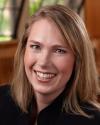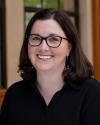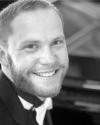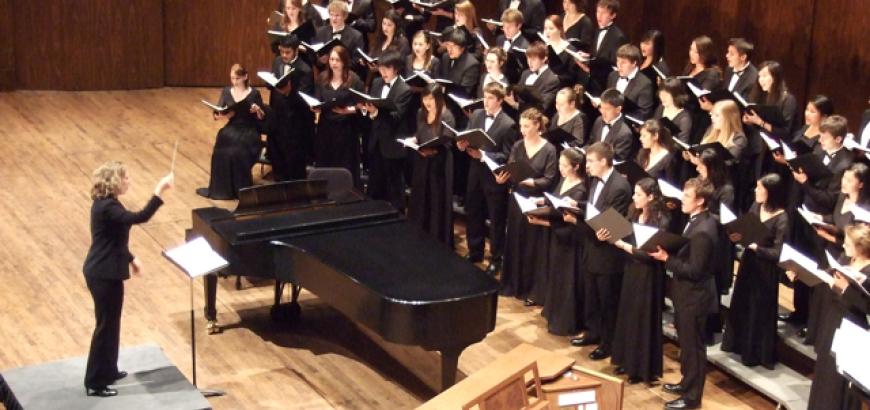The Chamber Singers (Geoffrey Boers) and University Chorale (Giselle Wyers, director) present “Fields and Fences,” featuring works exploring the duality of liberation and constraint.
Program
University Chorale
Giselle Wyers, director
Serena Chin, piano
Fences: Andre Thomas
At the Round Earth's Imagined Corners: Williametta Spencer
Drottin einn akur á (The Lord has a Field): Hildigunnur Runarsdóttir
A Field of Hosannas: Giselle Wyers
Meliza Redulla, soprano
Rosas Pandan: Visayan folk song, arr. George Hernandez
Akhila Narayanan, soprano
Combined Choirs
Crowded Table: The Highwomen (Hembry, McKenna and Carlile) arr. Ramsey
Charlie Dawson, guitar; Jessica Thaxton, violin; Hannah Carpenter, percussion
Chamber Singers
"Little Songs of Life: Paradox and Possibility"
Geoffrey Boers, director
Serena Chin, piano
A Little Song of Life: Reginald Unterseher
Evan Norberg, conductor
In Profundum Maris: Richard Nance
We are Held: Jessica French
Larke Witten, conductor; Thomas Wardian, guitar
Magnificat: Johann Sebastian Bach
with Baroque Ensemble, Tekla Cunnigham, director
Soloists: Mavis Chan, Larke Witten, Cee Adamson, Zachary Fitzgerald, Justin Birchell
All Seems Beautiful to Me: Eric Whitacre
Love Poetry: Matthew Hazzard
Notes and Translations
Little Songs of Life: Paradox and Possibility
Storytellers are an essential part of culture as they gently weave tales that lead us to think about ourselves, our place in the story, the truths we discover, and that we are closely knit to others in these truths. Choirs are storytellers. Tonight’s second half is a series of songs that revolve around the paradoxes of life: finding love in unexpected places, lifting up the lowly, putting down the mighty, wrestling and healing in mental health, being grateful when things look bleak. We will retell old stories such as Mary’s song from the Bible and the poetry of Walt Whitman, as well as tell new stories and recent poetry. As we have read, sung, and wrestled with these stories, we will in turn weave these together into our own story to share with you tonight.
A Little Song of Life: Reginald Unterseher
Evan Norberg, conductor
Reginald Unterseher, “Reg” is a Washington State composer and beloved music educator, conductor and singer. His “little song” urges us to find beauty in just being alive and seeing joy in small things.
In Profundum Maris: Richard Nance
Composer Nance and poet Kathryn Sparks, both Washington residents, collaborated on this profound and picturesque piece. The title is in Latin and translated as “Into the Depths of the Sea.” In Sparks’ words “the heart of this text simply reflects a sense that no matter how far I think I may have fallen…if I let myself be still enough to hear the melody of the universe it can rescue and revive me. Music has healing - perhaps even saving - power. The music undulates with waves and sinks to the depths; and when peace is found, the music rises in joy.
We are Held: Jessica French
Larke Witten, conductor
Seattle composer and musician Jessica French composed this work after the pandemic, set to a poem penned by choral conductor Robert Bode. The text is a tender set of pairs - pictures representing experiences and times of life - all of which are surrounded by the comforting words “we are held.” Comfort and reassurance, the composer French sees each of these pairs in different colors or emotions which lead to the final proclamation “We are bold to sing again.”
Magnificat: Johann Sebastian Bach (1685-1750)
Magnificat, literally “to Magnify,” is a Latin setting of the Hebrew poem referred to as the Song of Mary. It appears in the Biblical gospel of Luke, as Mary meets her cousin Elizabeth and announces that she is miraculously pregnant by God. Typical of Hebrew poetry, the “rhymes” are pairs of lines of poetry, at times restating a thought twice “My soul magnifies the Lord, and my Spirit rejoices…”, or at times a pair of opposites “He has put down the mighty…and exalted the humble and meek.”
For us in twenty-first century Seattle, and students from many faith and cultural traditions, we seek what we all can share from these texts. Bach’s beautiful and dramatic music paints emotional pictures of being lifted up, helping the poor and hungry, empowering a woman who in that time would have been punished for pregnancy out of wedlock. Each of these concepts embedded in Magnificat ring loudly in today’s time of social justice.
I. Magnificat Anima Mea (Chorus)
My soul magnifies the Lord
II. Et exsultavit (Mavis Chan)
And my Spirit rejoices in God, my Saviour
III. Quia respexit (Larke Witten)
For He has respected the lowly estate of his handmaiden (Mary, Mother of Jesus)
IV. Omnes generationes (Chorus)
Behold! All generations will call me blessed.
V. Quia fecit mihi magna Justin Birchell
For He that is mighty has done great things for me, and Holy is His name.
VI. Et misericordia (Chorus)
His mercy is on them that fear Him: throughout all generations
VII. Fecit Potentiam (Chorus)
He has shown strength with His arm, He has dispersed the crowd in the imagination of their hearts.
VIII. Deposuit potentes (Zachary Fitzgerald)
He has put down the mighty from their thrones, and exalted the humble and meek.
IX. Esurientes implevit (Cee Adamson)
He has filled the hungry with good things, and the rich He has sent away empty.
X. Suscepit Israel Chorus Trebles
He has been true to his covenant of mercy, and has lifted up his servant Israel.
XI. Sicut locutus est (Chorus)
As He promised to our forefathers, Abraham, and to all generations, forever.
XII. Gloria Patri/Sicut erat (Chorus)
Glory to the Creator, Redeemer, and Sustainer. As it was in the beginning, is now, and ever shall be, Amen.
All Seems Beautiful to Me: Eric Whitacre
Walt Whitman penned his famous “Song of the Open Road” in the second edition of his Leaves of Grass, long considered one of the great collections of American poetry. All Seems Good to Me is a portion of this “song” which uses active verbiage, “I ordain myself… I am better than I thought…I will inhale deep draughts…I will scatter…” to paint an inspiring picture of possibility and freedom. However, this cannot be heard today without us looking back into the racism, manifest destiny, and the inequities that occurred that surround these words.
As we are a group of musicians from many cultural traditions, spanning the globe but including the indigenous peoples of America, our choir looked at these words seriously and found ways to address historic (and present) concerns honestly and begin to recontextualize to find Whitman’s love of humanity and call for freedom for today’s world.
One student wrote “it is essential to remember that this is a work of westward expansion propaganda. In lines such as “the east and the west are mine and the north and the south are mine” we see the colonial trick of land ownership, the plethora of broken land agreements with indigenous nations, the systematic eradication and relocation of indigenous tribes, and the invalidating of indigenous sovereignty and self-governance. These processes were the backbone of manifest destiny, but they are also all processes that still occur in the United States today…(and) we do hope that it will provoke questions about the country we are in, the displacement that has led to this moment, the university that we sing for, and the communities that remain vibrant and healing.”
Another student offered “This piece, written by Whitacre in honor of such a military leader, took on special poignance for me. The Military leaders I have watched closely do not take lightly their duty to their country or to those they serve. For many, there is deep love of humankind at the core of their decision making. Duty and service are their higher call. They put their lives in the hands of others to serve and defend. Their families bid them farewell to contribute to a cause greater than themselves. And yet, we live in a world full of paradoxes…Can we live in this place of duality? Can we honor those who serve and question the decisions they are being ordered to fulfill? Can we acknowledge numerous poor decisions, bad actors, and failed initiatives while not vilifying those doing the best they could-–giving life and limb in the named cause of freedom and the individual hope of peace? Can we say never again to atrocities committed in the name of democracy? I believe we can.”
As we discussed current and very different issues such as the Israeli-Hamas war— seeing innocent people killed, atrocities by leadership and groups, and unthinkable loss on both sides, the students recognized that, as artists and storytellers, we work to be comfortable with the uncomfortable, sitting in between the now and the not-yet.
Love Poetry: Matthew Lyon Hazzard
We close this program of “little songs” with “Love Poetry”. The poet, dear friend and choral conductor Jonathan Talberg writes this poetry of his partner—composer Hazzard. The poet says, “I want to write…, but instead I stand there and watch your breath, knowing that I love you…more than I ever thought I could.”
Full of surprises, opposites, in-betweens, may these “little songs of life” offer hope, strength, and peace.
--Geoffrey Boers and 2023 UW Chamber Singers
University ChoraleSoprano Alto Tenor Bass Chamber SingersSoprano Alto Tenor Bass *Choir Cabinet Member Baroque Ensemble PersonnelViolin 1 Violin 2 Viola da Gamba Cello Oboe Continuo |
Biographies

Geoffrey Boers is Director of Choral Activities at the University of Washington in Seattle, a program widely recognized as forward thinking, unique, and of great distinction. Under his direction, the graduate choral program has developed a singular mission: to nurture the whole student as conductor-teacher-servant-leader-scholar. This vision has led the program to become one of the most vibrant and innovative in the country, attracting students from around the world interested in exploring the future of our art. Through his teaching he is exploring the evolution of conducting gesture and rehearsal pedagogy and their connection with the emerging neuroscience of mirror neurons, empathy, perception, learning, and personal transformation. His exploration has led to new thoughts about conducting and teaching with regard to breath, movement, artistry, personal awareness, and cultural development. Recently, his work has led to the mentoring of local choral cohorts of teachers and conductors who are interested in building professional communities of ongoing mentorship and musical development. He has developed such mentorship programs across the United States and Canada. In addition to these thoughts about mentorship he is actively working with other leaders in ACDA and NAfME to develop a more unified and useful system for development of musicianship, assessment, adjudication, and repertoire grading.
Geoffrey maintains an active conducting, teaching, workshop and clinic schedule; his recent engagements have included conducting concerts in Orchestra Hall in Minneapolis, Meyerson Concert Hall in Dallas, New York’s Alice Tully and Avery Fischer Hall at Lincoln Center, the Mormon Tabernacle in Salt Lake City, and Benaroya Hall in Seattle. In addition he has served as artist-in-residence in Toronto, Ontario, Mainz, Germany, as well as Seoul, Korea with the world-renown choir the Incheon City Chorale.
In addition to his position at the UW, Boers sings professionally and is the conductor of the Tacoma Symphony Chorus where he conducts both the choir and symphony players in a four-concert season.
Since his tenure at the University of Washington, the choral program has become a leader in promoting the performance, study and exchange of Baltic music in the United States. The choir has toured to the Baltic countries in 2000, 2005, 2010, and 2013. Geoffrey Boers was awarded a prestigious Royalty Research Grant in 2004 to create a Baltic Choral Library in collaboration with the UW Library as well as State and academic libraries in the Baltic. This collection of scores, manuscripts, vocal music, and writings is the first of its kind in the United States. This collection has promoted yearly exchanges with choirs and conductors from the Baltic area who travel each year to Seattle. Further, it has led to numerous UW choral students winning awards and scholarships to travel, study, and work in the Baltic countries.

Giselle Wyers (she/her/hers) is the Donald E. Petersen Endowed Professor of Choral Music at the University of Washington, where she conducts the award-winning University Chorale and teaches graduate and undergraduate courses in choral conducting and music education. She serves as the newly appointed School of Music's designated Diversity Liaison. University Chorale’s latest CD, Chasing Daybreak, will begin streaming in January 2024 on Apple Music and Spotify. Their third CD, Resonant Streams (on the MSR Music Recordings label) was featured in a 2018 Gramophone magazine article. Wyers is the newly appointed director of Concord Chamber Choir, an adult community chorus within the Columbia Choirs community. Her professional project choir Solaris Vocal Ensemble, specializes in the performance of contemporary American choral literature. Their premiere album Floodsongs, on the Albany Music label, won the American Prize Ernst Bacon Memorial Award for the Performance of American Music in 2017-18.
As a guest conductor, Wyers has led high school honor choirs and all-state choruses in New York (Alice Tully Hall, Lincoln Center), Kansas, Wisconsin, Georgia, Missouri, Louisiana, Connecticut, Nebraska, Texas, Washington, Alaska, Idaho, Nevada and Vancouver, Canada. She has conducted semi-professional ensembles across the United States and in Germany, the Netherlands, Estonia, and Sweden.
Wyers is a leading national figure in the application of Laban movement theory for conductors. She has served as guest lecturer in conducting at Sweden’s Örebro Universitet, European Festival of Church Music (Germany), Latvian Academy of Music, Eastman School of Music, Ithaca College, Westminster Choir College, University of Iowa, Hobart and William Smith Colleges and Portland State University.
Wyers’ choral works are published by Santa Barbara Music Publishing Company as part of the "Giselle Wyers Choral Series," as well as with MusicSpoke and Hildegard Publishing. Her works have been performed across the United States, South America, Canada, Australia, Cuba, and numerous European cities. She conducted her 30-minute choral cycle entitled And All Shall Be Well, in Carnegie Hall during May of 2022 with a consortium of NW-based choruses, and she will return with a newly composed choral/orchestral work in May of 2026. In 2021-22, she served as composer-in-residence for the Greater Seattle Choral Consortium's annual festivities celebrating the return of in-person singing (her appearance was sponsored by Consortio). Wyers is also committed to mentoring scholar-writers in the field, and served on the editorial board of ACDA’s Choral Journal for six years.

Larke Witten, mezzo soprano, music educator, voice teacher, choral conductor, and mother has intentionally kept one foot in the world of music and the other in the lives of her family members. She returns to academia to pursue a Master of Music degree in Choral Conducting.
Larke received a Bachelor’s of Music from Brigham Young University in Vocal Performance. There she studied voice with Dr. Lila Stuart-Bachelder. After graduating, she maintained a private voice studio teaching students ranging from young children to adults, but mostly working with high school students in the choral programs of the North East Independent School District of San Antonio, Texas. She maintained an in-demand studio regularly guiding students to the Texas All-State, Area, and Region Choirs, and to Superior ratings at Regional and State Solo and Ensemble Contests. One of her greatest joys is continued association with her former students seeing them succeed in all areas of life, including, but not limited to their musical endeavors. She believes every music student can play a role in the future success of the arts. Her students have gone on to sing in professional choirs, participate in television and stage work, perform folk rock, sing in cover bands, lead religious music, and serve as arts organization board members. Her current vocal coach is Professor Darrell Babidge, Vocal Department Chair, Juilliard School of Music.
Her previous professional choral appearances have been with the San Antonio Chamber Choir (as a charter member) and the South Dakota Chorale-performing with both at National ACDA Conventions. With SACC, she sang on the roster for eleven seasons under Scott MacPherson and Richard Bjella. Other choral projects were sung under the batons of Brian Schmidt, Robert Bode, Ronald Staheli, Mack Wilberg, Craig Hella Johnson, Ryan Murphy, Markdavin Obenza, Joseph Adam, Fred McIlroy, Steve Danielson, and Tim Westerhaus.
Recently in Washington, she was choral director of the program Peace in Christ for the Bellevue Nativity. She served as the Seattle North Stake Choir Director for The Church of Jesus Christ of Latter-day Saints and worked as Music Director of A Christmas Carol: A New Musical. She has sung as a soloist in oratorio, concert, recital and church settings in the state.
In Texas, she led the Texas San Antonio North Stake Choir, Texas San Antonio East Stake Choir, Texas San Antonio Temple Devotional Choir at the Alamodome, and the Stone Oak, Eden, Alamo, and Encino Park Ward Choirs of The Church of Jesus Christ of Latter-day Saints. She also had various soloist roles in her time in Texas.
Discography projects in which she appears: Unfrozen: Christmas in the Baltics (featured soloist), Spanish & Mexican Cathedral Music, The Choral Works of Andrew Rindfleisch, Eric Whitacre: The Complete a Cappella Works, 1991-2001, Songs of Praise and Remembrance, and The Redeemer: A Sacred Service of Music.
Her collaborations include the San Antonio Choral Society, San Antonio Messiah, San Antonio Mastersingers, the Children’s Chorus of San Antonio, the Tabernacle Choir at Temple Square, Choral Arts Northwest, Vox 16, St. James Cathedral Cantorei, Emmanuel Episcopal Church Mercer Island, and the Seattle Ensign Symphony and Chorus.
In her leisure time she enjoys traveling, floral arranging, glass fusing, hiking, gentle kayaking, attempting yoga, trying new restaurants, and being with her family and pets. She is passionate about refugee resettlement and assistance, human kindness, all things Brene Brown and/or Jane Austen, and blue and white pottery.

Evan has extensive knowledge in both classical and jazz styles, having been part of top notch ensembles in both community and school groups; Edmonds Community College’s Soundsation, Seattle Children’s Choir, Central Washington University’s Chamber Choir, Vocal Jazz 1, and Seattle based Choral Arts Northwest just to name a few. In the professional arena, Evan is a sought after bass/baritone soloist and has performed as a guest for many local community and school groups for major works, such as René Clausen’s Memorial, Handel’s Messiah, Faure’s Requiem, Mozart’s Vespers, and more.
Through inspiration and guidance by the great arrangers of the Pacific Northwest such as Vijay Singh, Kirk Marcy, and Kelly Kunz, Evan has been arranging his own jazz standards and compositions since 2003 with a steady stream of charts for his own ensembles. More notably, his arrangement of Love You Madly was premiered at the National American Choral Directors Association Conference in Chicago in 2011.
During the pandemic, Evan formed his own LLC called Envision Studios with business partner Daniel Schreiner. The goal was to help build virtual content for music teachers throughout the US to support their regular online rehearsals, projects, and virtual performances. Envision supported upwards of 40 school teachers in over 100 projects throughout the pandemic, bringing quality music programs to people's homes, enriching 'classroom' learning, and instilling confidence, recording, and musical skills to students across the country.
Evan holds degrees from Edmonds Community College, and Central Washington University, which includes a Masters from CWU in both Choral Conducting and Vocal Performance. Evan is excited to be a part of the Seattle Choir scene as a singing member of Choral Arts Northwest, local jazz group Last Call, director of choirs, jazz studies, theory and voice at Shoreline Community College, and Artistic Director of his passion project, Wellspring Ensemble.
